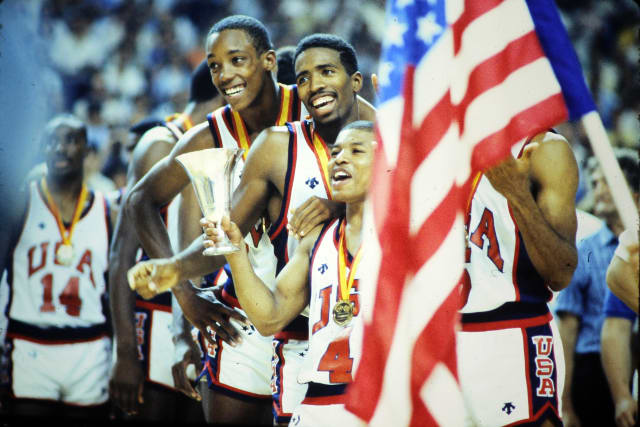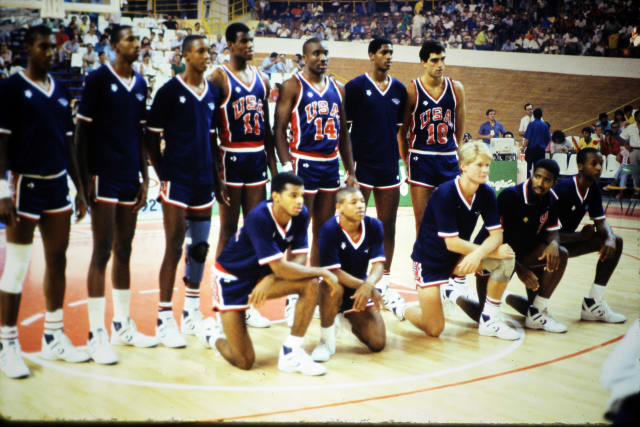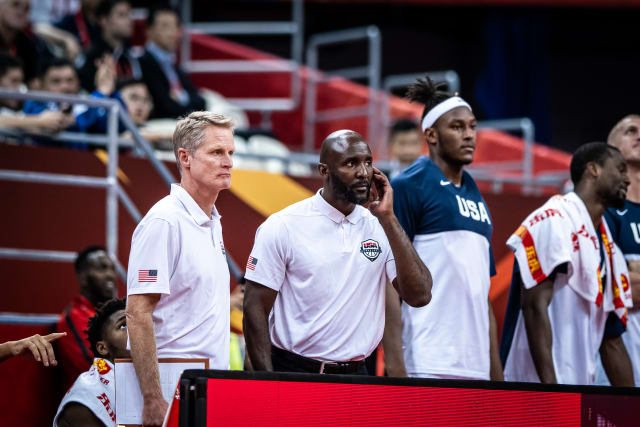Already a World Cup champion, USA assistant coach Steve Kerr looking for second title in China
SHANGHAI (China) - At the time of his first trip to the FIBA Basketball World Cup, USA assistant coach Steve Kerr was a 20-year-old student at the University of Arizona. He's back to win another trophy..
SHANGHAI (China) - At the time of his first trip to the FIBA Basketball World Cup, USA assistant coach Steve Kerr was a 20-year-old student at the University of Arizona. Though he would gain fame in a 15-year NBA career that earned five titles, including three as one of the Jordanaires with the Chicago Bulls, he was still an amateur when he traveled to Spain for the 1986 tournament.
It had been 32 years since the Americans had stood atop the world basketball podium when Kerr, a rising senior at the University of Arizona and his fellow soon-to-be NBA level famous teammates flew to Spain.
Speaking to FIBA in Shanghai, Kerr recalled, "It was an amazing experience, a great team with David Robinson, Charles Smith, Kenny Smith, Tommy Amaker, Sean Elliott. It was my first experience with international basketball at a high level. It was fun, just to play with different guys from different schools, guys I had seen on TV. Muggsy Bogues was on that team."
"I'M GETTING TO WATCH POP UP CLOSE FOR THE FIRST TIME. [...] THE EXPERIENCE HAS BEEN FANTASTIC." - Steve Kerr
Their first-round games were played at the Palacio de los Deportes de Ciudad Jardin in Malaga where the USA would win all five games, the biggest test being a one-point margin (73-72) over Puerto Rico. The next closest game was a 22-point demolition of Italy.
The next round was tougher, opening with a 74-70 loss to Argentina, before bouncing back to win the next four games. A 96-80 win over Brazil put them into the final against a far more seasoned Soviet Union side that included Alexander Volkov, Rimas Kurtinaitis, and 7ft 3in (2.20m) Arvydas Sabonis.
So much about it was new to Kerr and his teammates. "A lot of it was just the atmosphere in the stands. It was so different. We played the Brazilians in the semis and their fans were all decked out in yellow and banging drums, singing songs the whole game. There was smoke everywhere, people smoking in the arena."
 You won't find Steve Kerr in this photo; a severe knee injury sent him home before the final
You won't find Steve Kerr in this photo; a severe knee injury sent him home before the final
"They had these nets in Madrid where, if you shot a high-arcing shot that was a perfect swish, the nets would actually catch the ball at the bottom and spit it back out. During warmups, we kind of chuckled and said, can you imagine if they didn't allow that shot? We all just assumed the ref would count it. But sure enough, it happened during the game. Charles Smith hit a perfect swish. The thing hit the bottom of the net and came bouncing out through the top. Everyone stopped and the ref said, 'Play on'."
"Everything was different. You just had to adjust. Subtle rule differences you had to know. Technical fouls were a really big deal so you had to be composed and poised. And there was some great talent."
The NBA was not so international then. "Oscar was with Brazil. Drazen Petrovic was with Yugoslavia. Sabonis was playing for the [USSR] in his prime. Some really gifted players. The [USSR] had three or four guys who ended up playing in the NBA. They were incredible."
The fourth leading scorer for the U.S. at 10 points per game, even seasoned World Cup watchers may not recall that Kerr didn't play in the final. He wasn't even in Spain. Against Brazil in the Semi-Final four days earlier, where he had 14 points with less than half of the fourth quarter to play, his tournament ended.
"It was a great experience until I tore my knee up in the semifinals against Brazil."
As recounted in a 2017 Bleacher Report story: With the United States up by 11 and 4:10 to go, Kerr looked to dish to (Charles) Smith, but a defender cut in front, so Kerr was forced to reorient his body in mid-air, torquing his right knee and landing in a way legs were not meant to land. Snap. Kerr collapsed under the basket, writhing with a freshly torn ACL and MCL. His screams transcended language; Smith and the Brazilian superstar Oscar Schmidt carried him off the floor.
When the USA took the floor against the USSR, Kerr was already home prepping for surgery. After building a 10-point halftime lead, the USA held on to win 87-85.
It would be the last American men's senior team composed strictly of amateur players to capture a gold medal. The Soviet team would gain revenge at the 1988 Olympic Games in Seoul. A team of collegians would finish third at the 1990 World Cup and 1992 in Barcelona would herald the Dream Team as the Americans went professional.
"I was lucky. It was right on the borderline of when they started to have success. Our team doctor at Arizona told me, 'We can fix you up and you'll be alright in a year.' So, I redshirted and came back for my senior year and 15 more."

Steve Kerr was the fourth-leading scorer on USA's title winning team in 1986
Over his decade and a half on the NBA courts, he collected a full handful of championship rings. As an NBA head coach at Golden State, where he has mentored other USA stars including Stephen Curry, Klay Thompson, Draymond Green and Kevin Durant, he has started filling out the other hand with three more.
And now he is on the bench in China with Team USA, looking to do his part and assist on another World Cup trophy, and a bookend to his 1986 gold medal.
As for being on the other side of the competition this time, "It's a lot different but still really enjoyable to experience something different from what I'm used to in the NBA. Meeting a group of guys who I didn't know before. The only player I really knew is Harrison Barnes because I coached him. The rest I'm really meeting for the first time."
"I'm getting to watch Pop (USA coach Gregg Popovich) up close for the first time. I played for him but I've never coached with him. The experience has been fantastic."
You can read about the USA's FIBA World Cup 1986 run here.
FIBA
